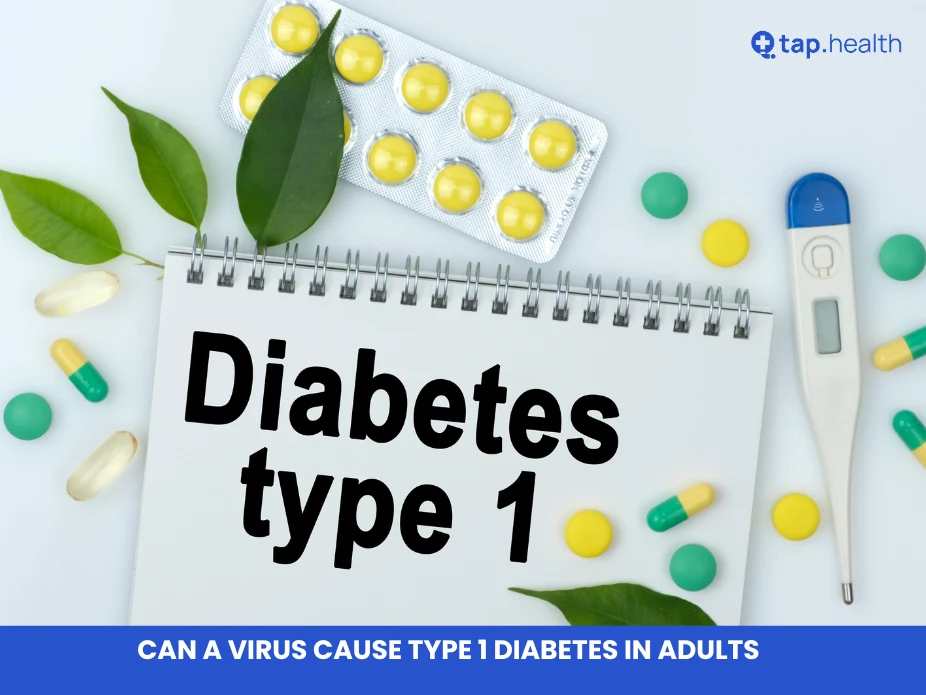Type 1 diabetes (T1D) is often seen as a condition that primarily affects children and young adults, but it can develop in adults too. One intriguing question is whether a virus could trigger T1D in adults. Research suggests that certain viral infections may play a role in its onset. This blog unpacks the connection between viruses and T1D, with relatable examples, expert insights, and practical advice.
Understanding Type 1 Diabetes
Type 1 diabetes is an autoimmune condition where the body’s immune system mistakenly attacks insulin-producing beta cells in the pancreas. This leads to a lack of insulin, a hormone crucial for regulating blood sugar levels.
While the exact cause of T1D isn’t fully understood, genetic and environmental factors, including viral infections, are thought to contribute to its development.
Can a Virus Trigger Type 1 Diabetes?
1. How Viruses May Play a Role
Viruses can trigger autoimmune reactions in genetically predisposed individuals. They may damage beta cells directly or confuse the immune system, causing it to attack healthy cells.
2. Viruses Linked to T1D
Several viruses have been associated with the onset of T1D, including:
- Enteroviruses: Such as coxsackievirus, which may damage pancreatic cells.
- Rubella: Known to increase the risk of autoimmune diseases.
- Cytomegalovirus (CMV): Associated with immune system disruptions.
3. Adult-Onset Type 1 Diabetes
Although T1D is more common in children, adults can also develop it, often referred to as latent autoimmune diabetes in adults (LADA). In some cases, viral infections may serve as the trigger, particularly if the individual has a genetic predisposition.
Real-Life Scenarios
Rajesh’s Diagnosis After a Viral Infection
Rajesh, a 35-year-old software engineer from Bengaluru, experienced flu-like symptoms for several weeks. Shortly after recovering, he began to feel excessively thirsty and fatigued. A visit to the doctor revealed high blood sugar levels, and further tests confirmed Type 1 diabetes.
“My doctor explained that the virus may have triggered my immune system to attack my pancreas. It was shocking, but understanding the connection helped me manage my condition better,” Rajesh shares.
Anjali’s Journey with Adult-Onset T1D
Anjali, a teacher in Pune, had no family history of diabetes but developed LADA after a severe viral infection.
“At first, I thought it was Type 2 diabetes, but my doctor identified it as LADA. Knowing the role the virus played made me more vigilant about my overall health,” says Anjali.
Expert Contributions
According to Dr. Arvind Khanna, an endocrinologist in Delhi, “Viral infections can act as a trigger for autoimmune conditions like Type 1 diabetes, especially in adults with a genetic predisposition. Recognizing the signs early is crucial for proper diagnosis and treatment.”
For more insights on diabetes and its causes, read: Can a Vegetarian Get Diabetes? Risks, Causes, and Prevention Tips.
Recommendations Grounded in Proven Research and Facts
1. Stay Updated on Vaccinations
Vaccinations for viruses like rubella and influenza can reduce your risk of severe infections, potentially lowering the chance of triggering autoimmune conditions.
2. Monitor Symptoms Post-Infection
If you’ve recently recovered from a viral illness, be mindful of symptoms like increased thirst, fatigue, or unexplained weight loss. These could indicate diabetes.
3. Early Screening
If you have a family history of autoimmune conditions or a recent viral infection, consider regular blood sugar screenings. Early detection of T1D or LADA can help in managing the condition effectively.
4. Support Your Immune System
A balanced diet, adequate sleep, and stress management can help maintain a healthy immune system, potentially reducing the likelihood of autoimmune reactions.
FAQs on Can a Virus Cause Type 1 Diabetes in Adults?
1. Can all viral infections cause Type 1 diabetes?
No, only specific viruses, such as enteroviruses or rubella, have been linked to T1D. However, these viruses are not the sole cause, as genetics and other factors also play a role.
2. Is adult-onset T1D common?
While less common than in children, T1D can develop in adults. It’s often misdiagnosed as Type 2 diabetes initially.
3. How can I tell if I have T1D or Type 2 diabetes?
Type 1 diabetes is autoimmune and may develop suddenly, often after an illness. Type 2 diabetes develops gradually and is more linked to lifestyle factors. Blood tests for autoantibodies can help distinguish between the two.
4. Can I prevent T1D triggered by a virus?
While you can’t fully prevent T1D, maintaining overall health, staying vaccinated, and managing infections promptly can lower your risk.
5. Are there treatments to reverse T1D caused by viruses?
Currently, there is no cure for T1D. However, treatments like insulin therapy and continuous glucose monitoring can help manage the condition effectively.



